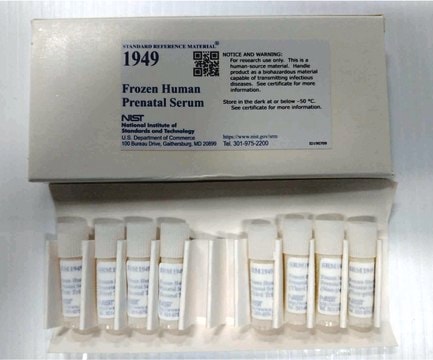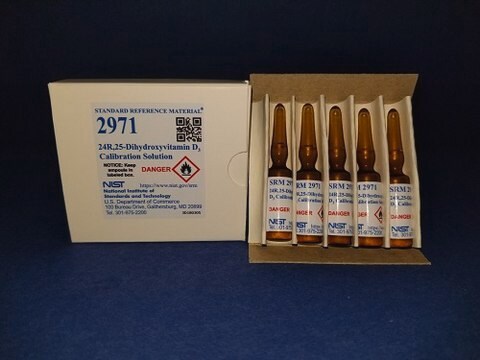NIST2972A
25-Hydroxyvitamin D calibration solutions
NIST® SRM® 2972a
Synonym(s):
25-OH Vitamin D Calibration Standards
Sign Into View Organizational & Contract Pricing
All Photos(1)
About This Item
UNSPSC Code:
41116107
NACRES:
NA.24
Recommended Products
grade
certified reference material
Quality Level
packaging
pkg of 20 x 1.2 mL
manufacturer/tradename
NIST®
application(s)
pharmaceutical (small molecule)
format
matrix material
General description
This Standard Reference Material (SRM) is intended primarily for use in calibration of instruments and techniques used for the determination of these vitamin D metabolites. A unit consists of twenty, two-milliliter ampoules, of four separate ethanolic solutions of vitamin D metabolites, five ampoules of each solution. Each two-milliliter ampoule contains approximately 1.2 mL of solution. The four separate ethanolic solutions of vitamin D metabolites are described below. For more information, please refer to theSDS andCOA.
25-Hydroxyvitamin D3 Calibrant in Ethanol Level 1 [25(OH)D3 in Ethanol Level 1]25-Hydroxyvitamin D3 Calibrant in Ethanol Level 2 [25(OH)D3 in Ethanol Level 2] 25-Hydroxyvitamin D2 Calibrant in Ethanol [25(OH)D2 in Ethanol]3-Epi-25-hydroxyvitamin D3 Calibrant in Ethanol [3-epi-25(OH)D3 in Ethanol]
SRM 2972A_cert
SRM 2972A_SDS
25-Hydroxyvitamin D3 Calibrant in Ethanol Level 1 [25(OH)D3 in Ethanol Level 1]25-Hydroxyvitamin D3 Calibrant in Ethanol Level 2 [25(OH)D3 in Ethanol Level 2] 25-Hydroxyvitamin D2 Calibrant in Ethanol [25(OH)D2 in Ethanol]3-Epi-25-hydroxyvitamin D3 Calibrant in Ethanol [3-epi-25(OH)D3 in Ethanol]
SRM 2972A_cert
SRM 2972A_SDS
Application
- Advanced Calibration for Vitamin D Analysis: The use of 25-Hydroxyvitamin D calibration solutions is pivotal in the development of a candidate reference method for the determination of vitamin D levels from dried blood spot samples. This method offers significant advantages in clinical settings, providing reliable and accurate assessment of vitamin D status which is crucial for diagnosing and managing conditions related to vitamin D deficiency. The research conducted by Zakaria et al. (2020) introduces a standardized approach that enhances the consistency of vitamin D measurements across various laboratories, ensuring high-quality diagnostic information (Zakaria et al., 2020).
Other Notes
Example analytes are listed below as a reference. Please download a current certificate at nist.gov/SRM for current analytes and certified values.
Vitamin D Metabolites: 25-Hydroxyvitamin D3 (Level 1), 25-Hydroxyvitamin D3 (Level 2), 25-Hydroxyvitamin D2, 3-Epi-25-hydroxyvitamin D3.
Vitamin D Metabolites: 25-Hydroxyvitamin D3 (Level 1), 25-Hydroxyvitamin D3 (Level 2), 25-Hydroxyvitamin D2, 3-Epi-25-hydroxyvitamin D3.
Legal Information
NIST is a registered trademark of National Institute of Standards and Technology
SRM is a registered trademark of National Institute of Standards and Technology
related product
Signal Word
Danger
Hazard Statements
Precautionary Statements
Hazard Classifications
Eye Irrit. 2 - Flam. Liq. 2
Storage Class Code
3 - Flammable liquids
WGK
WGK 1
Flash Point(F)
55.4 °F - closed cup
Flash Point(C)
13 °C - closed cup
Certificates of Analysis (COA)
Search for Certificates of Analysis (COA) by entering the products Lot/Batch Number. Lot and Batch Numbers can be found on a product’s label following the words ‘Lot’ or ‘Batch’.
Already Own This Product?
Find documentation for the products that you have recently purchased in the Document Library.
Customers Also Viewed
Wei Zheng et al.
OncoTargets and therapy, 12, 721-732 (2019-02-19)
Breast cancer is the most common cancer among women with ~1.67 million cases diagnosed annually worldwide, and ~1 in 37 women succumbed to breast cancer. Over the past decades, new therapeutic strategy has substantially improved the curative effect for women
Baoyuan Li et al.
Steroids, 159, 108585-108585 (2020-01-27)
To explore the effects of 1,25-dihydroxy vitamin D3 [1,25-(OH)2D3] on the proliferation and apoptosis of papillary thyroid carcinoma and to investigate its possible mechanism. The papillary thyroid carcinoma cell line TPC-1 was cultured, and the cells were divided into control
Our team of scientists has experience in all areas of research including Life Science, Material Science, Chemical Synthesis, Chromatography, Analytical and many others.
Contact Technical Service












